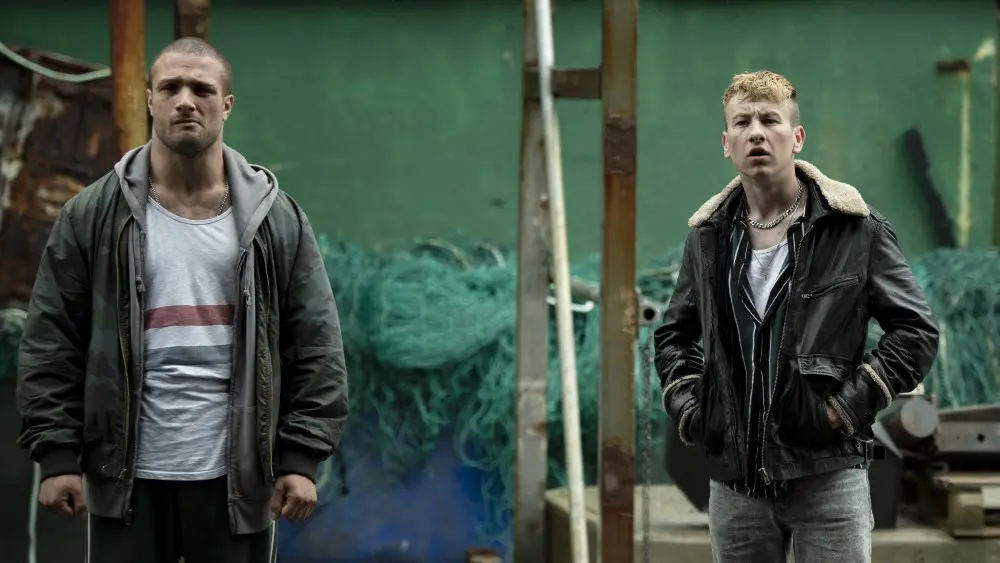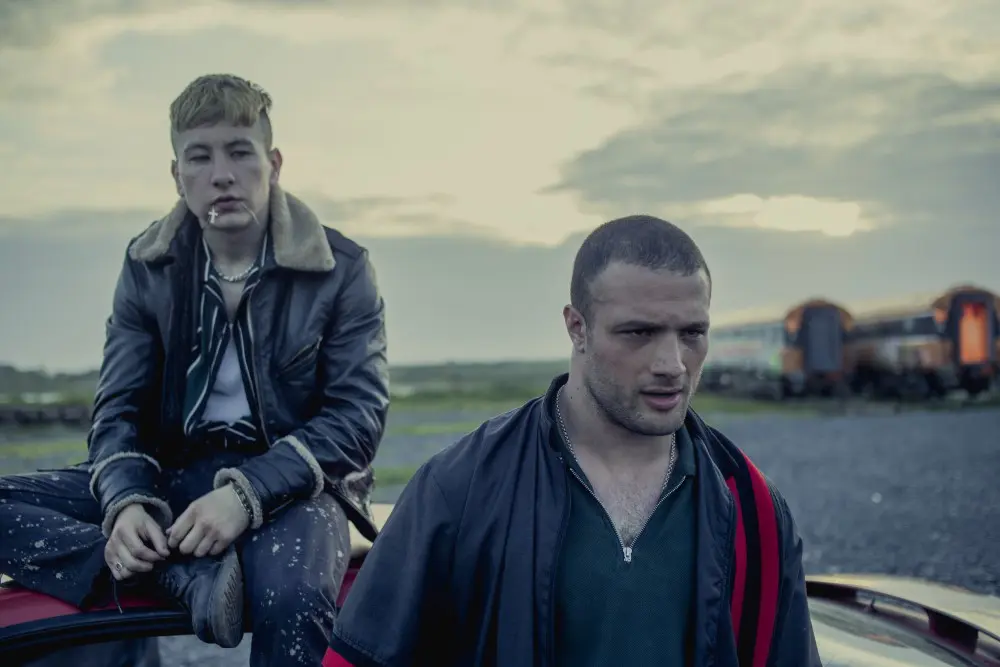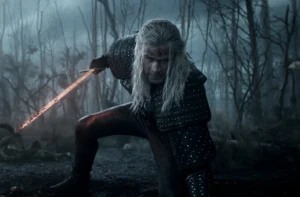Summary
Bleak and suspenseful drama set in the west of Ireland, not about crime but about the criminal lifestyle; and about man and his complex loyalties.
I finished watching Calm with Horses (titled The Shadow of Violence for USA distribution) half an hour ago and I’ve not been able to sit still. The restlessness, the sense of basic situations about to explode all got under my skin. Oh, not to mention the range of subtle themes; I’m wondering whether I’m seeing issues that the writer hadn’t intended. I’ll tell you what I thought, and what I saw; and I’m sure whatever you see in this film, it will give you plenty to think about too.
The central character in Calm with Horses is Douglas Armstrong (Cosmo Jarvis, Lady Macbeth), known as Arm, groomed into becoming a thug for the drug-dealing Devers family when he had to retire young from his promising boxing career. The Devers give him a sense of belonging and some small worth, and he applies violence on their behalf without much thought: as he says in the opening narration, sometimes violence is “just the way a fella makes sense of his world”. Things change when Arm is asked to kill for the first time, and he can no longer simply go along with expectations.
The Devers family is primarily made up of Paudi (Ned Dennehy, Tyrannosaur), his brother Hector (David Wilmot, The Guard), and their nephew Dympna (Barry Keoghan, The Killing of a Sacred Deer). Paudi is the intimidating Don of the family, a black cloud on the horizon for most of the film, while Dympna is the family’s frontman. To Arm, Dympna seems like a best mate, but to us viewers it looks more like Dympna is treating Arm as his prized pit bull… and here was the first uncomfortable theme which presented itself to me: unbalanced relationships. Arm is not bright and doesn’t know when he is being manipulated.
Arm has another family in the form of his ex Ursula (Niamh Algar, The Virtues) and non-verbal son Jack (the remarkable Kiljan Moroney in his acting debut). He is besotted with them both, but since Ursula has pushed him away (due to his unsavory connections), he doesn’t know Jack as well as he’d like: he barely accepts Jack’s autism (“I was like that at his age”) and can’t handle a public meltdown. So here is another theme of Calm with Horses: the nature of family. Is Arm’s found family any good for him, and is he any good for his formed family?
I think it could also be about the autistic spectrum disorder itself. It isn’t spelled out in any way, but I can see mild autism in Arm: he doesn’t know how to navigate social hierarchies, has to be told the best way to behave in unusual situations, and doesn’t read between the lines of what people tell him; because he thinks a little differently to most, it is easy for more savvy “skins” to take advantage. There are such similarities between him and his son, although the condition presents very differently: Arm is outwardly slow and awkward, but he may well have unwittingly grown up masking ASD. And then there are the horses: the title refers to the way both Jack and Arm almost become different people when they are around horses, a known calming influence for autistic people. The National Autistic Society consulted on how Jack’s development was presented in the film; as someone close to autism myself, I must say it was very refreshing to see stereotypes kept to a minimum.

Calm with Horses may be a film about criminals, a crime family in fact, but don’t go expecting The Godfather or Rise of the Footsoldier: if anything, the organization is a very loose one, like the one in Arkansas, but smaller. The family-centric tone reminded me more of the Australian Animal Kingdom: this is a parochial and incestuous domestic drama, rather than a thriller or film noir. That said, the film is nothing if not gripping: there is a slow, threatening tension for the first hour or so (I could tell something was going to go wrong, because of how Arm had been pushed, but not exactly how or for whom), and then it suddenly doubles. That moment, that scene was difficult for me to breathe through.
This was Nick Rowland’s first film as director; and he did a sterling job, with a strong team. Piers McGrail’s (Giri/Haji) beautiful cinematography of rural pastel buildings and brooding mountains complemented the dark tale just as well as if he had the eye of the writer himself. The screenplay was written by Joseph Murtagh (again, a first feature), based on the short story “Calm with Horses” by Colin Barrett (who consulted in the writing); and I think this was the first time I bought a copy of the book directly after watching a film, the writing caught my interest so well. Electronic musician Benjamin John Power (aka Blanck Mass) composed the film’s soundtrack; a carefully fitting one, never overpowering.
I’m now aware I’ve not said much about the cast, but the crux of it is they were so well chosen that they became their roles completely. I had seen Keoghan and Jarvis before (and glimpsed a couple of the others); but this was the first time Jarvis was in a film of his own, and Keoghan may have been more sinister in Sacred Deer, but I found him more believable here (especially when he had his own loyalty tested). Another discovery was Niamh Algar: she gave an earthy warmth to the character of Ursula, who had to deal with her own dilemmas of staying in Glanbeigh or moving to a town where better support was available for her son, and of rejecting or supporting Arm.
This reminds me: there is another pivotal female character in Calm with Horses, but we see very little of her (and hear nothing). This is adolescent Charlie, whose (suspected) assault is what prompted the revenge at the heart of the story. We only get hearsay from her brother (“she’s fine”) but watching how reluctant she is to celebrate her birthday, we can tell she’s not. In treating Charlie’s assault as a prompt for revenge rather than compassion, Calm with Horses is clearly also about masculinity: the need to hold a strong position, to identify allies, and protect one’s own… these aren’t necessarily “toxic” characteristics, but the film shows that they can be taken to a range of different conclusions.




